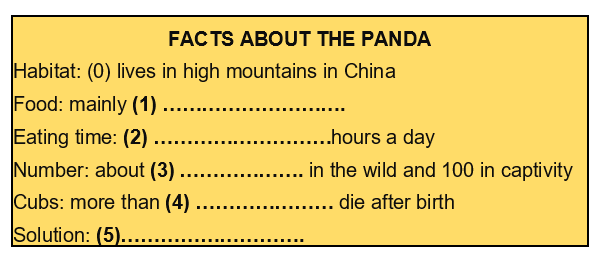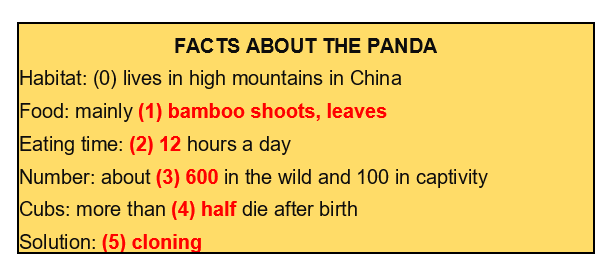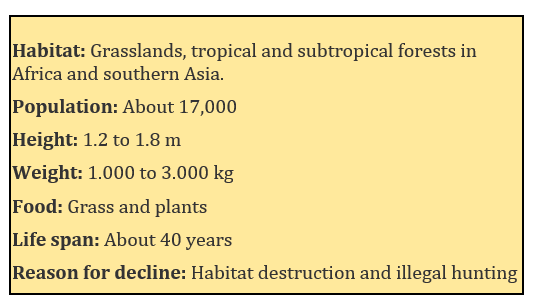Unit 9-10 lớp 12: Test Yourself D
Bài học Unit 9-10 lớp 12 phần Test Yourself D này giúp các em ôn tập kiến thức tổng hợp từ bài 9 đến bài 10 thông qua các bài tập ở các kỹ năng: Listening, Reading, Grammar & Writing.
Mục lục nội dung

1. Listening Test Yourself D Unit 9-10 lớp 12
Listen to the passage and complete the note with NO MORE THAN THREE words (Nghe đoạn văn và điền bản ghi chú với KHÔNG NHIỀU HƠN BA từ mỗi chỗ trống)
Guide to answer
Tạm dịch
NHỮNG SỰ THẬT VỀ GẤU TRÚC
Môi trường sống: sống ở vùng núi cao ở Trung Quốc
Thức ăn: chủ yếu là măng, lá tre
Thời gian ăn: 12 giờ một ngày
Số lượng: khoảng 600 con trong tự nhiên và 100 con bị giam giữ
Số con: nhiều hơn một nửa số con con chết sau khi sinh.
Giải pháp: nhân bản
Tapescript
High in dense bamboo forests in the misty mountains of southwestern China lives one of the world's rarest mammals: the panda. Pandas feed mainly on bamboo shoots and leaves. Occasionally they eat other plants, fish or small animals. Pandas eat fast and they eat a lot. They spend 12 hours a day doing it.
Pandas are extremely endangered today. There are only about 600 of these black-and-white bears in the wild and a hundred in captivity. One of the reasons is that the survival rate of the cubs is very low: more than half of them die shortly after birth. Chinese government is considering cloning the panda in their efforts to save this animal.
Tạm dịch
Ở trên độ cao trong rừng tre dày đặc ở những ngọn núi sương mù ở phía tây nam Trung Quốc có một trong số những động vật có vú hiếm nhất thế giới sinh sống: đó là gấu trúc. Gấu trúc ăn chủ yếu măng và lá. Đôi khi chúng ăn các loại thực vật, cá hoặc động vật nhỏ khác. Gấu trúc ăn nhanh và ăn nhiều. Chúng dành 12 tiếng một ngày để ăn.
Ngày nay, gấu trúc đang cực kỳ nguy cấp. Chỉ có khoảng 600 con trong tự nhiên và một trăm con bị nhốt. Một trong những lý do là tỷ lệ sống sót của con cái rất thấp: hơn một nửa trong số chúng chết ngay sau khi sinh. Chính phủ Trung Quốc đang xem xét nhân bản gấu trúc với nỗ lực cứu loài vật này.
2. Reading Test Yourself D Unit 9-10 lớp 12
Read the passage and decide if the following statements are true (T) or false (F) or not mentioned (Đọc đoạn văn và quyết định những câu nói đúng (T) hay sai (F) hay không được nói đến (NM))
It is difficult to know how many elephants once lived in the continent, but there may have been at least 3-5 million elephants in Africa in the early part of the twentieth century. People have always hunted elephants for meat, hides and ivory. As the human population grew and weapons became more advanced, elephants were under greater threat. In the late 1970s and early 1980s there was a huge decline in the number of elephants due to the increase in poaching. It is estimated that there are now about 500,000 elephants and they are living in a small number of countries. A ban was given on all international trade in ivory in 1989, and many governments started to give poachers severe punishments. Thanks to such timely actions, some elephant populations, especially those in southern Africa, have recovered over the last decade. However, numerous threats remain for Africa’s elephants.
T F NM
.png)
.png)
.png) 1. There are now about 3 to 5 million elephants in Africa. (Hiện có khoảng 3 đến 5 triệu con voi ở Châu Phi.)
1. There are now about 3 to 5 million elephants in Africa. (Hiện có khoảng 3 đến 5 triệu con voi ở Châu Phi.)
.png)
.png)
.png) 2. Elephants are hunted because they have nowhere to hide. (Voi bị săn đuổi bởi vì chúng không có nơi để trốn.)
2. Elephants are hunted because they have nowhere to hide. (Voi bị săn đuổi bởi vì chúng không có nơi để trốn.)
.png)
.png)
.png) 3. During the late 1970s and early 1980s, the number of elephants decreased sharply. (Vào cuối những năm 1970 và đầu những năm 1980, số lượng voi giảm mạnh.)
3. During the late 1970s and early 1980s, the number of elephants decreased sharply. (Vào cuối những năm 1970 và đầu những năm 1980, số lượng voi giảm mạnh.)
.png)
.png)
.png) 4. Nowadays, elephants are found only in certain countries in the world. (Ngày nay, voi chỉ có ở một số quốc gia trên thế giới.)
4. Nowadays, elephants are found only in certain countries in the world. (Ngày nay, voi chỉ có ở một số quốc gia trên thế giới.)
.png)
.png)
.png) 5. Since 1989, the trade in ivory has been prohibited all over the world. (Kể từ năm 1989, buôn bán ngà đã bị cấm trên toàn thế giới.)
5. Since 1989, the trade in ivory has been prohibited all over the world. (Kể từ năm 1989, buôn bán ngà đã bị cấm trên toàn thế giới.)
Guide to answer
1. F
There are about 3 to 5 million elephants in the early 20th century in Africa.
2. NM
3. T
4. T
5. T
3. Grammar Test Yourself D Unit 9-10 lớp 12
Complete the sentcnes with must, mustn’t or needn't (Điền các câu với must (phải làm gì), mustn't (cấm) hoặc needn’t (không cần)
1. DOCTOR: You……….go on a diet; but you …………..eat sensibly and you…………. overeat.
2. ZOO NOTICE: Visitors……………. feed the animals.
3. TEACHER: You…………………. read the whole book but you…………. read the first four chapters.
4. RAILWAY NOTICE: Passengers……………..walk on the line.
5. SCHOOL NOTICE: The lifts…………… be used in case of fire.
6. DOCTOR: You ……………. take more than two of these pills at once. Three might be fatal.
7. DOCTOR (to patient’s wife): If the pain has gone, he ..................... take any more of these.
Guide to answer
1. DOCTOR: You needn’t go on a diet; but you must eat sensibly and you mustn’t overeat.
(BÁC SỸ: Bạn không cần ăn kiêng; nhưng bạn phải ăn một cách hợp lý và bạn không được ăn quá nhiều.)
2. ZOO NOTICE: Visitors mustn't feed the animals.
(SỞ THÚ THÔNG BÁO: Du khách không được cho động vật ăn.)
3. TEACHER: You needn’t read the whole book but you must read the first four chapters.
(GIÁO VIÊN: Các em không cần đọc toàn bộ cuốn sách nhưng các em phải đọc bốn chương đầu.)
4. RAILWAY NOTICE: Passengers mustn’t walk on the line.
(ĐƯỜNG SẮT THÔNG BÁO: Hành khách không được đi trên đường ray tàu.)
5. SCHOOL NOTICE: The lifts mustn’t be used in case of fire.
(TRƯỜNG HỌC THÔNG BÁO: Các thang máy không được sử dụng khi có hỏa hoạn.)
6. DOCTOR: You mustn’t take more than two of these pills at once. Three might be fatal.
(BÁC SỸ: Ông không được uống hai viên thuốc cùng một lúc. Chúng có thể gây tử vong.)
7. DOCTOR (to patient’s wife): If the pain has gone, he needn’t take any more of these.
(BÁC SỸ (nói với vợ của bệnh nhân): Nếu cơn đau đã qua, anh ta không cần uống thuốc nữa.)
4. Writing Test Yourself D Unit 9-10 lớp 12
Study the information about rhinos, then write a paragraph describing the animal and suggest possible solutions to protect them from extinction (Nghiên cứu thông tin về tê giác, sau đó viết một đoạn văn mô tả về nó và đề nghị những biện pháp có thể được để bảo vệ chúng khỏi tuyệt chủng)
Tạm dịch
Môi trường sống: Cỏ, rừng nhiệt đới và cận nhiệt đới ở Châu Phi và Nam Á.
Dân số: Khoảng 17.000
Chiều cao: 1,2 đến 8 m
Trọng lượng: 1.000 đến 3.000 kg
Thức ăn: Cỏ và cây
Tuổi thọ: Khoảng 40 năm
Lý do suy giảm số lượng: Sự phá hủy môi trường sống và săn bắt trái phép
Guide to answer
Rhinos are one of the endangered animals that are on the verge of extinction. Rhinos are large animals and need a lot of space to live in. Now people can find them in grasslands, tropical and sub-tropical forests in Africa and southern Asia. A rhino is about from 1,2 to 1,8 meters high and weighs from 1,000 to 3,000 kgs. Theỉr main food is grass and plants. A rhino's average lifespan is about 40 years.
It is estimated that there are now about 17.000 rhinos in the world. But there is a great decline in the population of rhinos due to the hunting and poaching, and especially their habitat destruction.
World Wildlife Fund has been working to conserve rhinos for over 40 years. It has launched rhino conservation projects to protect this species from extinction by translocating rhinos to the conservancy run by local communities.
Tạm dịch
Tê giác là một trong những động vật có nguy cơ tuyệt chủng đang trên bờ vực tuyệt chủng. Chúng là loài động vật lớn và cần rất nhiều không gian để sinh sống. Hiện tại có thể tìm thấy chúng ở đồng cỏ, rừng nhiệt đới và cận nhiệt đới ở Châu Phi và Nam Á. Tê giác có chiều cao từ 1,2 đến 1,8 mét và nặng từ 1.000 đến 3.000 kg. Thức ăn chính là cỏ và cây cỏ. Tuổi thọ trung bình của 1 con tê giác khoảng 40 năm.
Người ta ước tính có khoảng 17.000 tê giác trên thế giới. Nhưng có sự suy giảm lớn về số lượng loài tê giác do săn bắn và săn trộm, và đặc biệt là sự phá hủy môi trường sống của chúng.
Quỹ Động vật Hoang dã Thế giới đã hành động để bảo tồn tê giác trong hơn 40 năm. Họ đã đưa ra các dự án bảo tồn tê giác để bảo vệ loài này khỏi sự tuyệt chủng bằng cách chuyển tê giác sang hoạt động bảo tồn do các cộng đồng địa phương quản lý.
5. Practice Task 1
Read the passage carefully and choose the correct answer (Đọc đoạn văn thật kĩ và chọn câu trả lời đúng)
By the year 2025, the Earth could lose as many as one fifth of all species known to exist today. In recent centuries, hundreds of species have disappeared, almost always as a result of human activities. The passenger pigeon, one familiar example, was a source of food until excessive hunting and habitat loss caused its extinction in 1914. The North American bison, whose populations were decimated by settlers and market hunters in the 1800s, came close to sharing the same fate. Bison survive today only because of the efforts of early conservationists.
Today, species require such efforts more urgently than ever. An essential task that falls to present-day conservationists is to determine which species are most, endangered, so that conservation resources' can be applied where action is needed most. Species are categorized by the degree to which their survival in the wild is threatened. World Wildlife Fund offers a sampling of animals and plants that fall mainly within the two most serious categories of- threat: critically endangered and endangered. What threatens these species' existence? Some of the top threats are habitat destruction by unsustainable logging and ever-encroaching human settlement; pollution of water, soil, and air by toxic chemicals; unnatural climate changes due to fossil fuel use; unmanaged fishing that exhausts fish stocks; and illegal hunting to supply the demand for skins, hides, traditional medicines, food, and tourist souvenirs. The list which conservationists presents only a fraction of the species at risk of extinction today and does not include thousands of species whose status we do not yet know. Hundreds of species without common names have been left out, which means that while many mammals are on this list, only a few insects and mollusks are included.
Species listed here range from the largest animal on Earth, the blue whale, to the majestic tiger, to the humble thick-shell pond snail. Large or small, beautiful or ugly, all species play a role in the complex circle of life. All of us depend on the natural resources of our planet. Each time a species is lost, the complexity, natural balance, and beauty of our world is diminished. And what threatens plants and animals ultimately threatens people as well.
1. According to the first paragraph _______.
a. species extinction is only caused by hunting
b. human beings protect wife life much more than they do harm to them
c. the main cause of species extinction is human activities
d. we can stop radically species extinction by 2025
2. The North American bison _______.
a. was completely extinct in 1800s
b. was not the aim of human hunting
c. was raised by settlers in 1800s
d. has escaped from extinction thanks to conservationists
3. Species are categorized _______.
a. to prevent hunting
b. to provide food
c. to destroy their habitats
d. to give preferential right to conserve
4. Which sentence is true?
a. Medicine is not a factor to cause species extinction.
b. The list which conservationists present does not include all kinds of species.
c. Pollution does nothing to species extinction.
d. Conservationists have good knowledge of all kinds of mollusks.
5. According to the last paragraph, _______.
a. species extinction has no relationship to human beings
b. what threaten plants and animals can do nothing to human beings
c. human beings depend on natural resources to survive
d. not every, species has a role in the circle of life.
6. Practice Task 2
Choose the best option (Chọn câu trả lời đúng nhất)
1. She ___ be ill. I have just seen her playing basket ball in the school yard.
a. needn't b. shouldn't c. mustn't d. can't
2. Hiking the trail to the peak _______ be dangerous if you are not well prepared for dramatic weather changes. You _______ research the route a little more before you attempt the ascent.
a. might/ can b. may/ mustn't c. can/ should d. must/ needn't
3. Peter has been working for 10 hours. He _______ be very tired now.
a. needn't b. must c. has to d. should
4. He is unreliable. What he says _______ be believed.
a. cannot b. must not c. may not d. might not
5. I _______ find my own way there. You _______ wait for me.
a. should/ can't b. have to/ must
c. can/ needn't d. might/ mustn't
6. I was reading the book last night before I went to bed. I never took it out of this room. It ____ be lying around here somewhere. Where ___ it be?
a. might/ needn't b. can/ should
c. shouldn't/ may d. must/ can
7. When you have a small child in the house, you _______ leave small objects lying around. Such objects _______ be swallowed, causing serious injury or even death.
a. should/ must b. should not/ might
c. needn't/ may d. mustn't/ can't
8. Frank's wallet is lying on the coffee table. He _______ it here last night.
a. must have left b. should have left
c. must be leaving d. needn't leave
9. Jenny's engagement ring was precious! It _______ have cost a fortune.
a. must b. should c. can d. needn't
10. You _______ take your umbrella along with you today. It _______ rain later on this afternoon.
a. ought to/ mustn't b. needn't/ will
c. will/ must d. should/ might
7. Conclusion
Qua bài học này các em cần củng cố từ vựng và ngữ pháp đã học qua các bài học từ Unit 9-10 theo các kĩ năng Listening, Reading, Grammar và Writing. Thông qua những bài tập này các em sẽ có cơ hội ghi nhớ thêm kiến thức mà mình đã học.
Tham khảo thêm



